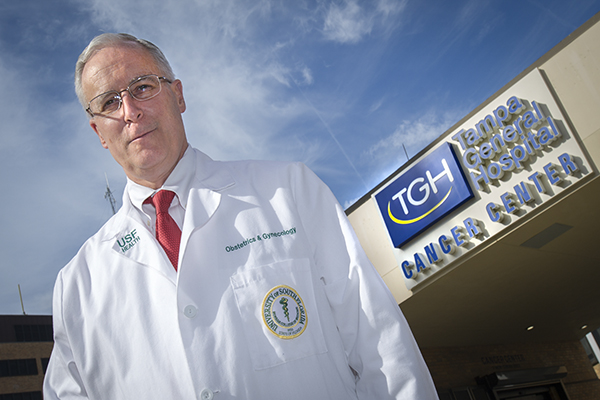This story is part of a series highlighting faculty who are shining examples of quality and compassionate patient care and patient safety. Every day, these health care providers put their patients first. In the process, they create successful models of advanced care focused on empathy, safety, technology and evidenced-based medicine, models that carry through everything they do – into their practice, their teaching, their research, their community outreach, and into the USF Physicians Group.
When Thomas Rutherford, MD, sees a patient, he really sees the patient’s entire family.
He is an ovarian cancer surgeon and many times the type of cancer his patient has is caused through genetic mutations that were passed to her by one of her parents. It also means she will pass it on to her children. For daughters, it might be the ovarian cancer itself, but maybe also breast cancer. For sons, new science is linking the genetic mutation to prostate and also breast cancers.
That makes Dr. Rutherford a physician for not only the whole patient, but also that patient’s whole family for generations to come. And for that insight, coupled with a demeanor of warmth and compassion, patients are giving him high marks on surveys for offering them a highly engaged patient experience.
***
Dr. Rutherford joined the USF Health Morsani College of Medicine in March. He leads the Gynecologic Oncology Division in Department of Obstetrics and Gynecology and directs the medical school’s gynecologic oncology fellowship program, as well as surgical quality at the Tampa General Hospital Cancer Center.
He is a nationally recognized expert for ovarian cancer treatment and research and, at USF, he is creating a new model of cancer care delivery that builds on strengths of existing programs to enhance accessible, integrated and high-quality care for patients and their families.
In less than six months on the job at USF Health, he has earned top scores in Press Ganey patient satisfaction surveys provided to Tampa General patients, earning scores that placed him in the 99th percentile for communications with patients.
That level of scoring is significant and puts him among only 1 percent of physicians across the country and across all specialties.
While Dr. Rutherford said he can’t put his finger on exactly what he does to earn him these high marks, he boils it down to these key points: Do what you promise to do, ask to enter a room, apologize if they’ve had to wait, listen when they ask questions, and thank them for coming in.
“Knowledge alone doesn’t meet the expectations our patients have of us,” he said. “We have to add more to the conversation, listen to their concerns, and make our encounter be the best it can be. Our patients deserve this and it can greatly improve the care we provide them.”
Dr. Rutherford is the first to admit he does not accomplish this alone – his entire team of providers commits to these philosophies.
“Everyone knows what I expect and everyone pulls together as a team to get that kind of score,” he said.
Since arriving in Tampa, Dr. Rutherford has launched a community outreach program to connect the top USF-TGH gynecological cancer surgery teams with referring community obstetricians and gynecologists across the region. The aim is to coordinate treatment closer to home for their patients whenever possible and have surgeons provide the more routine surgeries in community hospitals closer to home for patients, while more complex cases requiring the multispecialty team approach and expertise for advanced patient support would be sent to TGH.
“The sooner they can be reunited with their families, the better their recovery can be,” he said. “Going to a local hospital for the more routine procedures and saving the highly specialized procedures for our multidisciplinary teams at TGH does exactly that.”
***
Dr. Rutherford grew up on a farm in rural Pennsylvania where his family grew their own food. He is one of five siblings and says his childhood gave him a realistic look at life.
“We all learned as kids that you work every day,” Dr. Rutherford said.
That’s likely why he insists a patient’s family be involved in the care plan: he realizes how connected she is with her home life and how everyone else should pick up the slack while she fights her disease.
“We actually have a sign-up sheet for handling the day-to-day things she likely does to maintain the household,” Dr. Rutherford said.
That all-encompassing approach carries into his teaching, as well.
“I tell every resident (physician) I teach to treat every patient like she is your own mother,” he said. “We look at the whole family. It’s about the disease process and the care process and that includes the home life. When you take care of patients, you’re caring for the entire family.”
***
At a recent patient follow-up appointment, Dr. Rutherford put his core philosophies to practice the moment he entered the exam room. The patient is already smiling when he says “Thank you for coming in today. You’re looking good, how do you feel?”
It’s likely that this patient’s survey answers helped push up Dr. Rutherford’s Press Ganey score, a point he shrugs off.
“That’s the thing with surveys: the problem with being on top is that there’s only one way to go,” he said.
He added that it takes more than common courtesy to succeed with patients. Total patient care encompasses prevention, high-risk genetic screening, education and research, individualized treatment, survivorship, and end-of-life care.
“We do a lot of outreach and bring what we know to families, especially about genetics,” he said. “In the end, they usually teach me more than I teach them.”
Story by Sarah Worth, photos by Eric Younghans, USF Health Communications.



